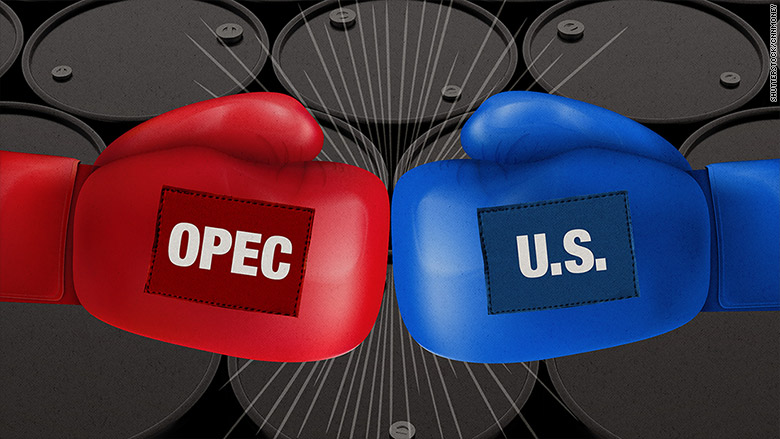
OPEC all but declared "mission accomplished" this week in its efforts to thwart U.S. oil production.
In a report Monday, the cartel predicted the U.S. shale oil boom could be over by the end of 2015.
The world has too much oil production at the moment, and it has caused crude oil prices to meltdown from over $100 a barrel in the summer to under $45 now -- a six-year low.
Someone needs to scale back, but OPEC, led by Saudi Arabia, has refused to make cuts in an effort to squeeze American shale producers.
OPEC is claiming an early victory by pointing to declines in the number of U.S. drilling rigs and significant cuts in big energy's spending plans as evidence the U.S. is caving.
Related: Oil plunges to a 6-year low. Is $30 next?
American shale here to stay: Yet OPEC is underestimating one of the most important characteristics of shale: its incredible flexibility.
Unlike traditional producers, shale companies can easily stop pumping on completed wells when prices drop and then quickly return to them. When prices rebound, so should U.S. production, making dips in output short-lived.
"OPEC is in denial. Shale production will never go away," said Fadel Gheit, an Oppenheimer analyst who covers the energy industry.
"The beauty of shale production is you can dial it up or dial it down. You can adjust your speed depending on the traffic. But you will not get out of the road. You're still in the game," he said.
Related: Iran nuclear deal could make oil even cheaper
Breakeven points are falling: Not only are shale producers able to quickly adjust to the changing price, they are becoming much more efficient thanks to technological innovations.
The oil price they need to be profitable is much lower than before. The trend is likely to continue, especially as previously sky-high costs for labor and services decline substantially, Gheit said.
It's also premature to say that U.S. oil output is slowing. Last week, the International Energy Agency said U.S. oil production shows no signs of slowing.
Unlike OPEC, the International Energy Agency seems to recognize the advantages that shale companies have. That's why the IEA predicted American oil production will keep growing through 2020.

Related: How Colombia went from murder capital to tech powerhouse
Who will blink first? Saudi Arabia has made it clear it has no desire to balance the market by pumping less oil. The supply glut could be worsened by a potential deal between the West and Iran that would lift sanctions on the country's oil industry.
U.S. oil production should finish this year at around 9.7 million barrels per day, said Tom Kloza, chief oil analyst at the Oil Price Information Service. That means this year could surpass the previous all-time record of 9.6 million set in 1970.
If oil prices get back to the $70 to $90 range, U.S. oil production could eventually climb to 10 million or 12 million barrels per day, Kloza said.
"Shale is not even on the DL (disabled list) or the taxi squad. It's waiting on the bench," he said.
Related: End of OPEC is closer to reality
Shale assets won't disappear: The Saudis seem to be betting the American shale industry will be forced to close up shop if oil stays too low for too long.
While it is true that some shale producers won't survive, it's not like their assets will just disappear. The wells will stay in the ground and be acquired by larger energy companies like ExxonMobil (XOM) and Chevron (CVX).
"It's survival of the fittest. The assets will transfer to another oil company with deeper pockets and a greater resilience to lower oil prices," Gheit said.


